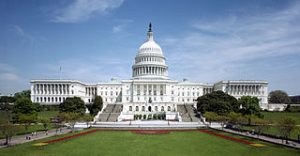March 11, 2019 •
NYCU Video Digest – March 11, 2019
Keeping track of changes to federal and state ethics and campaign finance laws is tough. Here are four stories you don’t want to miss from last week about changes happening all across the country!
Keeping track of changes to federal and state ethics and campaign finance laws is tough. Here are four stories you don’t want to miss from last week about changes happening all across the country!
February 27, 2019 •
U.S. House Administration Committee Approves of Campaign Finance and Ethics Legislation
On February 26, legislation aimed at reforming U.S. campaign finance, lobbying, and ethic laws advanced in committee. The House Administration Committee approved of H.R. 1, the For the People Act, by a party-line vote of six to three. In the […]
 On February 26, legislation aimed at reforming U.S. campaign finance, lobbying, and ethic laws advanced in committee. The House Administration Committee approved of H.R. 1, the For the People Act, by a party-line vote of six to three.
On February 26, legislation aimed at reforming U.S. campaign finance, lobbying, and ethic laws advanced in committee. The House Administration Committee approved of H.R. 1, the For the People Act, by a party-line vote of six to three.
In the sweeping 571-page bill, corporate PACs would be required to make certifications annually with the Federal Election Commission. Those certifications would include affirming under penalty of law no foreign national participated in any way in the decision-making processes of the PAC; corporate board members who are foreign nationals abstained from voting on matters concerning the corporation’s PAC; and the PAC did not solicit or accept recommendations from any foreign national.
The legislation expands the definition of foreign national to include any corporation, limited liability corporation, or partnership that is not a foreign national but is owned or indirectly controlled by foreign nationals meeting statutory thresholds of ownership or voting. The threshold is five percent of voting shares if the foreign national is a foreign country, a foreign government official, or a corporation principally owned or controlled by a foreign country or foreign government official. The threshold is 20 percent if the foreign national is any other type of foreign national. Corporations not considered foreign nationals would fall under the definition when a foreign national has the power to direct, dictate, or control the decision-making process of the corporation with respect to its interests in the United States or with respect to activities in connection with federal, state, or local elections.
Additionally, the bill restructures the Federal Election Commission, amends the federal conflict of interest law, and expands the revolving door provision by prohibiting Members of Congress from serving on corporate boards. Introduced by Rep. John Sarbanes, the bill requires any organization involved in political activity to disclose its largest donors, creates a multiple matching system for small donations for political campaigns, and amends rules governing super PACs.
If passed, the bill also requires presidential candidates to disclose their tax returns, prohibits partisan gerrymandering, increases oversight over election vendors, creates an automatic voter registration across the country, and changes registration requirements for lobbyists and foreign agents.
January 7, 2019 •
First U.S. House Bill Introduced is Sweeping Campaign Finance Bill
The first piece of legislation introduced into the new U.S. House of Representative was a sweeping 571-page campaign finance bill. Introduced by Rep. John Sarbanes, House Bill 1, the For the People Act, requires any organization involved in political activity […]
 The first piece of legislation introduced into the new U.S. House of Representative was a sweeping 571-page campaign finance bill. Introduced by Rep. John Sarbanes, House Bill 1, the For the People Act, requires any organization involved in political activity to disclose its largest donors, creates a multiple matching system for small donations for political campaigns, and amends rules governing super PACs.
The first piece of legislation introduced into the new U.S. House of Representative was a sweeping 571-page campaign finance bill. Introduced by Rep. John Sarbanes, House Bill 1, the For the People Act, requires any organization involved in political activity to disclose its largest donors, creates a multiple matching system for small donations for political campaigns, and amends rules governing super PACs.
The bill also restructures the Federal Election Commission, amends the federal conflict of interest law, and expands the revolving door provision by prohibiting members of Congress from serving on corporate boards. If passed, the bill also requires presidential candidates to disclose their tax returns, prohibits partisan gerrymandering, increases oversight over election vendors, creates an automatic voter registration across the country, and changes registration requirements for lobbyists and foreign agents.
Sarbanes argued the rational for the bill in his press release, stating, “The bold, transformative set of reforms that we introduced today will strengthen our democracy and return political power to the people by making it easier, not harder, to vote, ending the dominance of big money in our politics and ensuring that public officials actually serve the public.”
State and Federal Communications, Inc. provides research and consulting services for government relations professionals on lobbying laws, procurement lobbying laws, political contribution laws in the United States and Canada. Learn more by visiting stateandfed.com.

